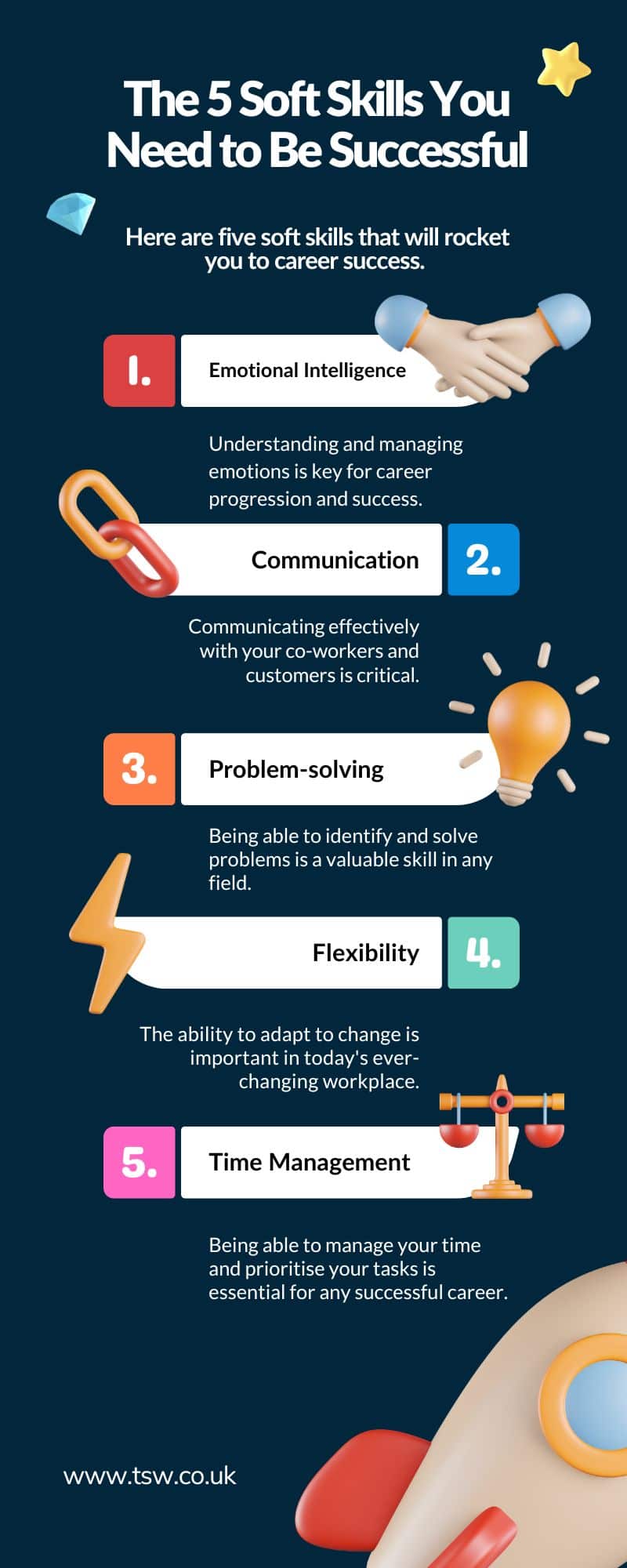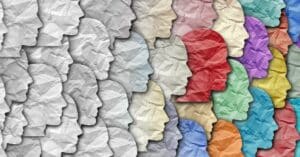Soft skills are the unsung heroes that can catapult your career or business to dazzling heights. They’re the magic dust that binds teams and unlocks potential.
Whether you’re a bright-eyed graduate, a business mogul, or a seasoned pro, there’s always room to level up your soft skill game.
So, join me as we uncover the world of soft skills and their impact on business and career success.
Key Points in This Article:
- Soft skills are important for interacting with others and being a successful professional. They can be transferred between vastly different roles and developed in both personal and professional contexts.
- They cover a wide range of topics, such as communication, time management, leadership, emotional intelligence and more.
- Soft skills can be trained and developed, but the best approach may vary depending on the specific skill and the individual.
What are soft skills?
Picture this: you’re at a party, and you notice two people talking. One person is dominating the conversation, not giving the other person a chance to speak. The other person, on the other hand, is actively listening, asking questions, and building rapport.
Which person would you rather have a conversation with? I bet it’s the second one, right? That’s because they’re showcasing some of the many soft skills that make a huge difference in how we interact with others.
Soft skills, in a nutshell, are those intangible, non-technical abilities that help us effectively communicate, collaborate, and navigate the complexities of our professional and personal lives. They’re often seen as the “secret sauce” that sets you apart from others who may have similar technical skills or qualifications.
You’d be forgiven for thinking the term is a new concept, but it has been around in various forms since the early 20th century.
Soft skills, alongside their ‘hard skill’ counterparts, have been and always will be critical for career, work and business success.
Soft skills vs hard skills – what’s the difference?
Visualise yourself as a world-class chef (how cool would that be?). You’ve got all the hard skills down – knife skills, cooking techniques, you name it. But what if you struggle to work with others, can’t communicate your ideas effectively, or buckle under pressure? That’s where soft skills come into play!
Soft Skills
On the flip side, soft skills are those intangible interpersonal abilities that help you succeed in any role, regardless of your field. They’re the “people skills” that make you a great team player, a supportive colleague, and an effective problem solver.
In today’s world, employers are looking for the perfect blend of both hard and soft skills. Why? Because while hard skills get the job done, soft skills make sure it’s done harmoniously, efficiently, and with a touch of finesse.
It’s like the perfect recipe for success, with a dash of technical expertise and a generous helping of people skills.
So, to truly shine in your career, don’t just focus on sharpening your hard skills. Make sure to give your soft skills some love too – they’re the secret ingredients that’ll make you stand out from the crowd and thrive in any situation!
10 Examples of Soft Skills with Resources
There are hundreds of soft skills, but here are some of the ones that are cited as being the most important:
- Communication: The art of expressing yourself clearly and confidently, both in writing and verbally.
- Empathy: The ability to understand and share the feelings of others, which helps build strong relationships.
- Time Management: Being able to prioritise tasks and manage your time efficiently.
- Problem-Solving: The knack for analysing a situation, identifying potential solutions, and making decisions based on available information.
- Adaptability: The capacity to embrace change and adjust your approach as needed.
- Teamwork: Collaborating effectively, respecting opinions, and valuing diversity for a common goal.
- Leadership: Guiding and motivating a group towards a shared objective with a clear vision.
- Emotional Intelligence: Recognising, understanding, and managing your own and others’ emotions.
- Critical Thinking: The skill of objectively assessing information and arguments to draw logical conclusions, make informed decisions, and solve problems by questioning assumptions and considering diverse perspectives.
- Persuasion: The art of influencing others by effectively presenting ideas, arguments, and solutions, in order to gain their support or agreement.
Hard Skills
Hard skills are those technical, job-specific abilities you need to excel in your field. They’re the stars of your resume and the tools of your trade.
Your hard skills are the concrete, measurable skills you learn in school, training programs, or on the job. Think programming languages for a software developer, or financial analysis for an accountant.
Some examples of hard skills include:
- Graphic Design: Creating visual masterpieces using design software like Adobe Illustrator or Photoshop. It’s the art of turning ideas into eye-catching graphics, logos, and layouts.
- Data Analysis: Crunching numbers like a pro, using tools like Excel to interpret data, spot trends, and make informed decisions. It’s the Sherlock Holmes of the business world!
- Project Management: Juggling multiple tasks, deadlines, and resources to ensure projects are completed on time and within budget. It’s like being the conductor of a well-tuned orchestra!
- Search Engine Optimisation (SEO): Optimising websites and content to rank higher on search engines and attract more organic traffic. It’s the digital wizardry that makes your website stand out in a crowded online world.
- CPR Certification: Knowing how to perform life-saving cardiopulmonary resuscitation in an emergency. It’s a skill that can make all the difference in a critical situation.
As you can see, hard skills are the nuts and bolts that enable you to execute specific tasks in your chosen field. But, they’re only one part of the success equation.
To truly excel in your career, you need those adaptable, intangible soft skills that help you navigate the twists and turns of the professional world.
Why are soft skills important for career development?
Soft skills unlock the secrets to navigating the professional world with empathy, self-awareness, and adaptability. They pave the way for strong relationships, effective teamwork, and seamless collaboration. When combined with hard skills, they create a winning formula, making them a top priority for employers.
In customer-centric roles like sales and management, soft skills are indispensable. By connecting with customers, understanding their emotions, and adjusting your approach, you build lasting, positive impressions that keep them coming back.
Soft skills also enhance your problem-solving abilities, enabling you to tackle challenges with a creative and resourceful mindset. This resilience is invaluable in a constantly changing work environment, where the ability to adapt and innovate is paramount.
Moreover, soft skills propel your career trajectory. Showcasing your ability to inspire, take initiative, and communicate effectively sets you apart, increasing your chances of landing leadership roles and fostering a growth mindset.
So, invest in developing and training those soft skills, and watch your career or business take flight.
The 5 Soft Skills You Need to Be Successful (Infographic)

How Do You Develop or Train Soft Skills?
Ah, the million-dollar question: how do you develop or train those elusive soft skills? While it might seem like a tricky puzzle, the good news is that with a bit of effort, anyone can polish their soft skills!
You see, soft skills are a bit like muscles 💪 – they need regular exercise to stay in shape. The key lies in practice, reflection, and learning from feedback. Unlike hard skills, there’s no one-size-fits-all blueprint for mastering soft skills. It’s a personal journey, where you explore your own strengths and weaknesses and figure out what works best for you.
For instance, let’s say you want to improve your public speaking skills. You could join a local Toastmasters club, take a presentation skills course, practice speaking in front of a mirror, or even record yourself to analyse your performance.
Over time, you’ll grow more comfortable and confident, and you’ll be rocking the stage like a pro!
Then there’s a skill like time management; once you understand the time management principles and tools available to you, it’s just a case of ‘practice makes perfect’. And, perhaps, a little work on habit-changing!
Another great way to develop soft skills is to seek feedback from others. Be open to different perspectives, and use that input to fine-tune your approach. This is the perfect approach to developing soft skills like emotional intelligence.
Remember, Rome wasn’t built in a day, and neither will your soft skills. It’s all about continuous learning, adapting, and evolving.
So go ahead, flex those soft skill muscles and watch yourself transform into an all-around superstar – you’ve got this!
8 Useful Ways to Develop Your Soft Skills
Clearly, there are many ways to develop your soft skills, and the best approach may vary depending on the specific skill and the individual. It is also important to remember that you can develop your soft skills outside of the workplace.
Here are 8 methods that may be effective for you:
- Take on leadership roles: Volunteer to lead projects or teams, and practice decision-making and delegation. Create a schedule for a day trip, organise a quiz for friends or help a family member resolve a problem.
- Communicate effectively: You can practise clear and effective communication through everyday writing, speaking, and listening. If you would prefer more active learning, you could join a club, volunteer for a customer-facing position or take a targeted communications course.
- Practise flexibility: Try adapting to different situations by changing your routine, multitasking and doing something out of your comfort zone. Cooking is great for managing multiple tasks, while making last-minute plans to try a new hobby could help you break your routine and challenge your limits.
- Develop your emotional intelligence and interpersonal skills: Discover our Brand New Emotional Intelligence Course – Our carefully designed Emotional Intelligence Training Course is tailored to provide you with practical, real-world skills that will elevate your personal and professional life. Dive deep into the core components of Emotional Intelligence and uncover how they directly relate to your success.
- Work on your problem-solving and stress management: Consider all aspects of the problem and keep an open mind. Staying calm and focused will help keep your positive outlook. You could also start journaling, join problem-solving or ‘hackathon’ sessions or try a new problem-solving approach like the 5 whys or Six thinking hats
- Release your creativity: With repetitive tasks, it can be easy to go into autopilot. Instead, take a step back and think about alternative ways of working that might be more effective. Use a range of techniques to explore ideas, like role-playing and mind-mapping.
- Improve your teamwork: A key part of most jobs, collaboration can lead to a healthier and happier work environment. You could try tackling fun challenges together, set out clear team objectives and timelines or take on a role that you haven’t tried before. All this will get you used to working together in different ways.
- Build on your teaching and training: As well as taking part in courses or attending training, you can also try sharing your skills – both hard and soft – with others. You could run ‘lunch and learn’ sessions, become a mentor or help out with apprentices. You would likely be using all your soft skills by doing this, and you might even learn something new yourself.
Developing soft skills takes time and effort, so it is important to be patient and persistent.







